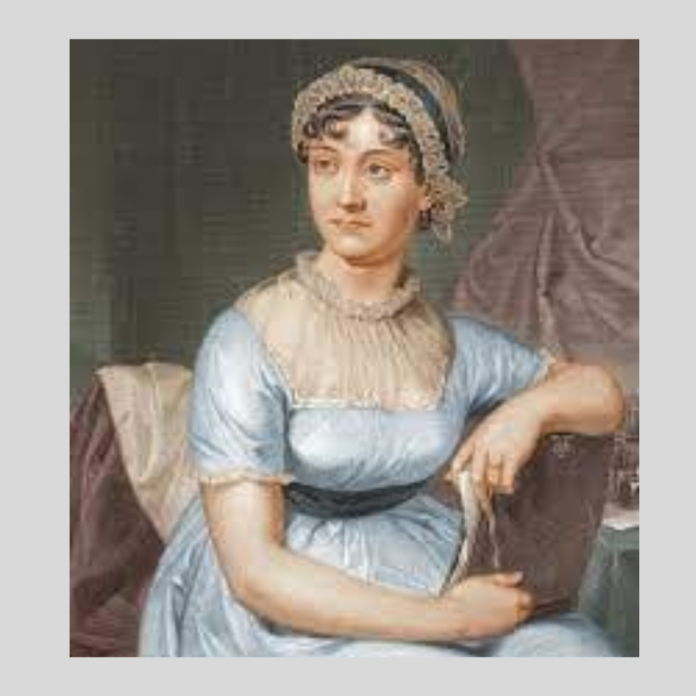“Let other pens dwell on misery and guilt.”
An author who never regretted her choices for creating strong female characters in the patriarchal society of England. Jane Austen never thought about the consequences of her published works, and the supposed anger they might evoke in households with orthodox upbringing. Her literary style is considered to be a result of her witty nature and indirect satire in an appealing way for her means of critique.
Jane Austen was a British novelist who grew up in beliefs of gender equality and egalitarianism in the working class. As she grew older her perceptions about these beliefs were changed when she saw the prejudices that were against women in the world of literature.
Her works reflect her ideology and critique of the British traditions and views of marriage and regarding marriage as a means of social security for a woman’s future in a Europe that promised liberty, equality and republican nature in modern democracies. Her views on marriage never changed because of the unvarying nature of people’s ideology regarding women.
Jane Austen wrote a best-seller in an era, when the writings of a woman were not taken seriously. She criticized the ways and traditions of the European society and how different they precepted the roles of men and women.
Jane Austen has created several classic characters and stories of women with strong beliefs who never bend or change themselves based on the society’s wish. Her stories reflect her bold views on politics, society and the upper-class of England, and how the country life in the 18 th and 19 th century Britain was coping with the changes in ideology and how households were viewing the role of women in the society. Her characters are regarded timeless and viewed as roles way ahead of time. Her literary style experienced change with the transition between the 18 th and 19th century with her work evolving into a piece of literary idealism.
‘Pride and Prejudice’ is one of her most admired works, and is also partially based on her life according to some readers. Her personality strongly coincides with the protagonist, Elizabeth Bennet. The story follows Elizabeth as she deals with issues of manners, upbringing, education and marriage in the 19th century.
As the central character, Elizabeth, her father’s favourite and her mother’s least favourite child, must come to terms with the conflicting values implicit in her parents’ antithetical characters. She is like her father in her scorn of society’s conventional judgements, but she champions the concept of individual merit, independent of money and rank.
Pride and Prejudice is one of the most revolutionary feminist novels of that era, known for its strong opinionated characters.
“It is truth universally acknowledged, that a man in possession of a good fortune must be in a want of a wife.”
This famous first line of ‘Pride and Prejudice’ sets up the story’s themes of money and marriage that drives much of the plot. In this period, money played a particularly important role for women because they could not, by law, inherit money. Therefore Mr. Bennett’s entire estate would go to his male cousin Mr. Collins with nothing to go to Mrs. Bennett or the five daughters. With limited career options, women had to look to marriage for financial security.
Austen’s novel is set in a world where both expectations and reputation matter. Austen sets her satirical eye on this readiness to judge one’s character based on one’s social position.
The story deals with the turbulent relationship of Elizabeth and Darcy. The book criticises the setback of ideology in the society.
Elizabeth is the second eldest daughter in the family. Her mother is obsessed with getting her five daughters married to one of the houses of the upper-class.
It focuses on how society highlighted the importance of marriage for a woman, and didn’t allow the same opportunities to be availed by a woman as men.
When a wealthy young man; Mr. Bingley, who is entitled to a fortune comes to their neighborhood to live, Mrs. Bennet hopes to get one of her daughters married to him.
Mr. Darcy, a friend of Bingley is a man with a cold personality and his behavior is considered rude, harsh and arrogant. The character of Mr. Darcy is quite complex and quite dichotomous.
Elizabeth is close to her elder sister Jane. She confides in her and their bond is built on trust. Jane is still innocent to the corrupt world, and is always pursued by her younger sister to follow her dreams.
The story starts with the arrival of Mr. Bingley, a wealthy young gentleman who has rented a manor near the Longbourn village. Mrs. Bennet desperately tries to get her daughters married in the upper-class. She pays a visit to Mr. Bingley, and he invites the Bennet family to a ball which he will be hosting.
At the ball, Mr. Bingley is taken by Jane and spends the evening, dancing with her. The neighborhood is less pleased with his friend Fitzwilliam Darcy. He refuses a dance with Elizabeth, which makes everyone view him as obnoxious and arrogant. Elizabeth is insulted and this first bad impression provides the impetus for her fixed attitude against him – “I could easily forgive his pride, if he had not mortified mine.”
But soon he seems to be attracted to Elizabeth because of her wittiness and intelligence.
Elizabeth is a girl with liberal thoughts and she criticises the conservative society in a light humor and sometimes rage.
Mr. Bingley invites Jane to pay a visit to his estate, but on the way, she catches illness because of the downpour and is forced to stay at his estate. Elizabeth, in order to tend to Jane has to go a long distance, travelling through muddy fields and arrives in a shabby attire, much to the annoyance of Charles’s sister.
The poor were considered of an inferior character by the nobles in the English society, which undermined the value of equality.
When they both return home, they find Mr. Collins waiting for them. He is a clergyman who has an appeal for the Bennet estate, which has been entailed. Mr. Collins is a proud fellow who presents a proposal to Elizabeth. But she rejects his proposal, wounding his pride.
Austen, quite cleverly shows how the people only married for acquiring an inheritance and the greed among them, which ultimately led to relations being established on a fragile foundation.
The bennet girls become friendly with a military regiment who are stationed in a nearby town. An officer, Wickham is friendly towards Elizabeth. He tells her about the ‘absurd’ Darcy who also cheated him of an inheritance. As winter arrives, the news of Mr. Collins and Charlotte, Elizabeth’s friend have become engaged comes. Charlotte, a poor; daughter of a retired knight has agreed to marry Collins for improving her financial state. Though she finds Collins to be annoying, but she is practical in her approach. When Elizabeth questions her for accepting his proposal, Charlotte says, “I am no romantic, I just want to be comfortable.”……. and comfort is something she feels certain Mr. Collins can provide.
The author tells about the discouraging society, which never promoted gender equality and undermined women in the working class, considering that a woman can never earn enough and a marriage acts as a means of her future’s safety.
Jane goes to town for seeing her friend and hopes to see Mr. Bingley, but instead gets a visit from his sister who humiliates her.
The marriage prospects for Bennett girls are bleak. One day, when Elizabeth visits the Collins estate to meet Charlotte, she meets Darcy; who shockingly proposes to her, but Elizabeth rejects him, considering him arrogant and unpleasant in his manners. She scolds him for cheating Wickham, and steering Bingley away from Jane.
She is, indeed, prejudiced against the prejudices of society. From this premise, she attacks Darcy’s pride, assuming that it drives from the causes that Charlotte Lucas identifies : “with family, fortune, everything in his favour…… he has a right to be proud.”
A few days later she finds a letter from Darcy addressed to her. He explains his behavior and says that he only urged Bingley to stay away from Jane because he thought that it was only affection and not a marriage worthy relation, and that Wickham is a liar and that he attempted to elope with Darcy’s younger sister.
The character of Elizabeth is quick to judge a person, but she never regrets her opinion, instead she builds a new image and tends to fade away the misjudgements. In fact, before it was published, the working title of the book was “First Impressions” which communicates even more strongly her intentions to take to task those who judge solely on the accidents of class.
As the regiment is leaving town; Lydia, Elizabeth’s younger sister gets her will to stay in Brighton with Wickham. Elizabeth goes to Pemberly with her relatives, where she gets the news from a letter sent by her father stating that Lydia has eloped with Wickham and is probably living out of wedlock. Elizabeth rushes home, and hears that her father and uncle are going on a pursuit to go and find Lydia but they return with no news of Lydia, heavy heartedly. After that a letter from Mr. Gardiner, Elizabeth’s uncle comes stating that Wickham has agreed to marry Lydia. Mr. Bennet knows that he has only agreed because of the offered money.
A modern problem of families dealing with dowry is so meticulously presented by the author. It shows that people didn’t make relations without the monetary benefit. The upper-class despite having the joys and luxuries was hollow from the inside and that hollowness was shown in their character and the greed for power and wealth.
Bingley returns to Longbourn and presents his suit for Jane, Darcy also comes to stay with him. He never mentions his desire to marry Elizabeth. One evening Lady Catherine de Bourgh pays a visit to the Bennets and says that she has heard her nephew, Darcy, proposing his wish to marry Elizabeth, however she considers her a person of inferior character and that she should refuse his proposal. Elizabeth agrees but says that she won’t do anything against her happiness. A little later Darcy gently proposes his wish to marry her and she accepts.
Elizabeth questions the ideals of the society, and doubts the role of women according to the world.
The book is an exceptional marvel of critique and the emotional values that are portrayed by the characters.
Austen’s ‘Pride and Prejudice’ continues to remain as popular as it was upon it’s release in the United Kingdom in 1813. At a time when women novelists were beginning to take tentative steps for acceptance and recognition, the quality of Pride and Prejudice made a statement on behalf of all women novelists of the time. Women of Austen’s era were either dependant on their fathers or their husbands for economic livelihood. Hence, the wealth and social status of suitors were of paramount importance for a young lady to assent to marriage.
This is a very Materialistic and superficial way of looking at marriage, yet it is true in Austen’s time as it is now. Perhaps the criteria might have shifted slightly with women’s emancipation and relative economic independence achieved over the last two centuries. The criteria of selecting the groom might have gotten modified over the years, but still the game of courtship plays out in all it’s intrigue and passion across eras.










